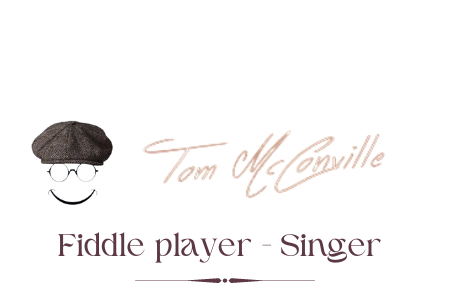CD's and Reviews
If you would like to buy one of Tom’s CD’s, you can contact him here.
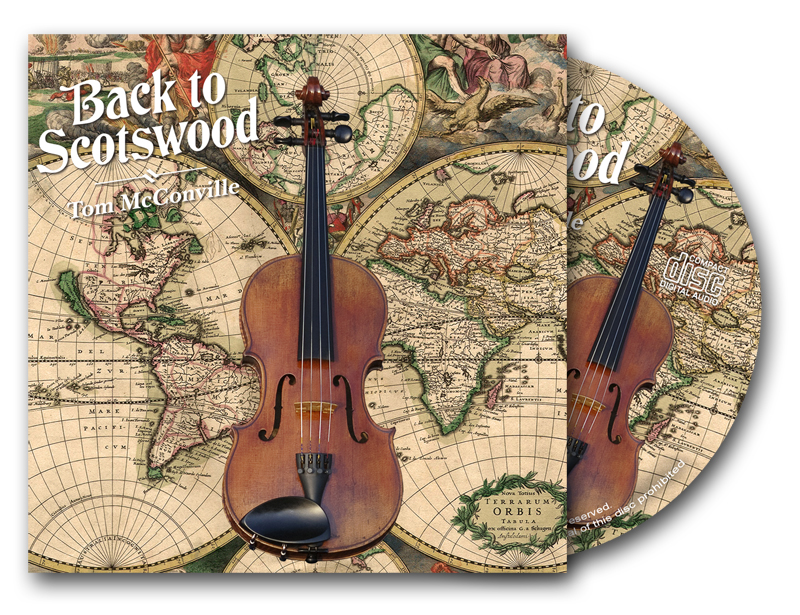
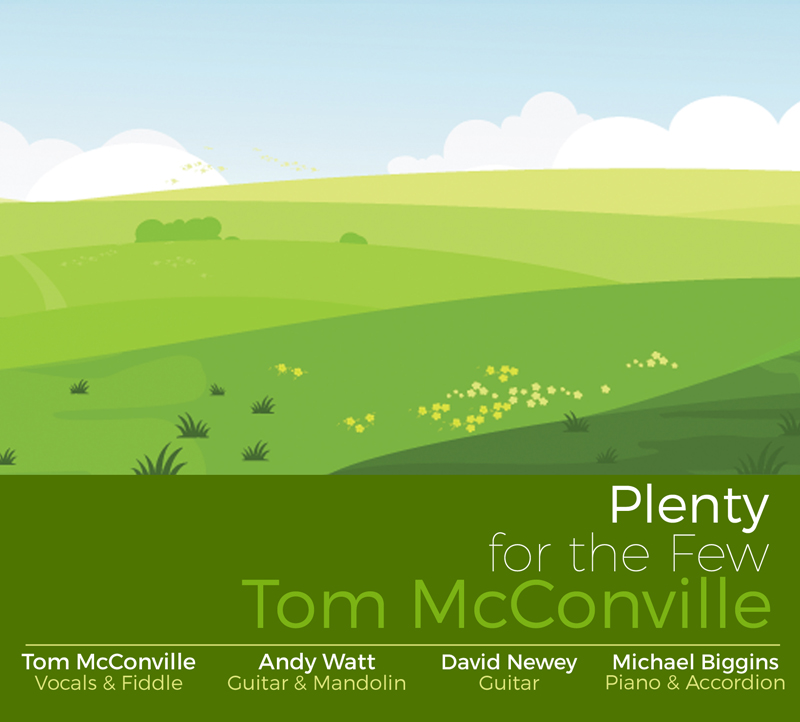
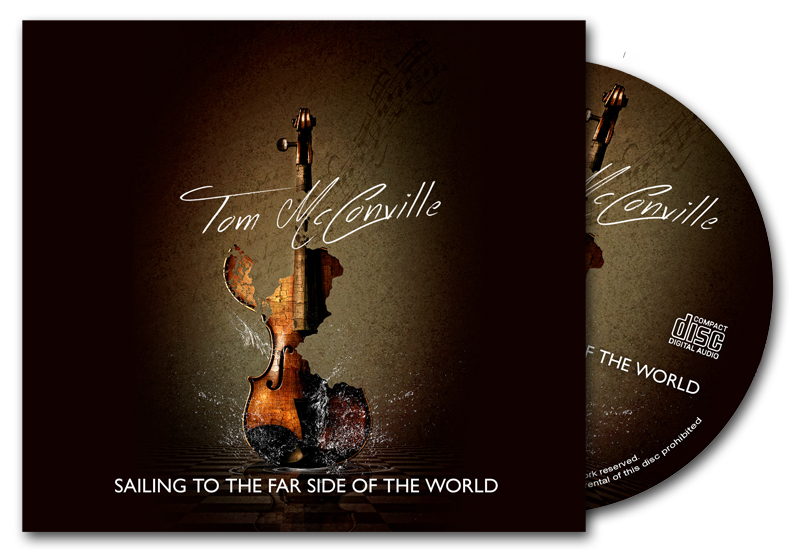
Reviews
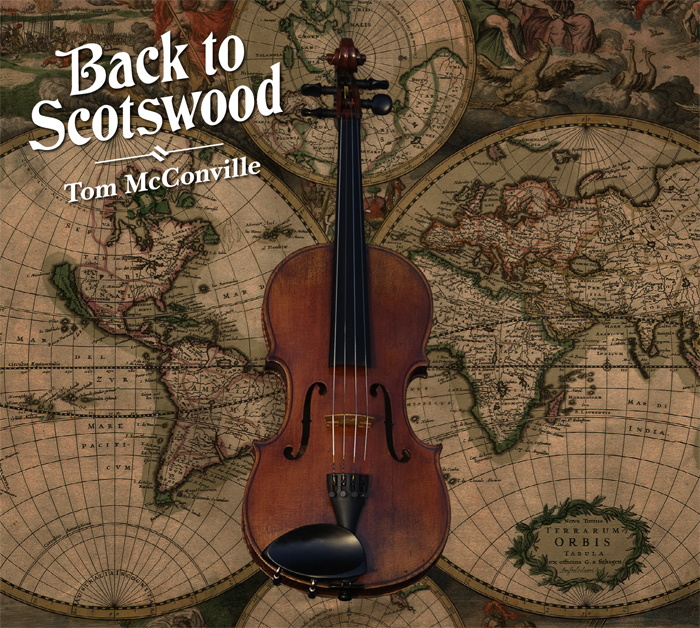
TOM McCONVILLE
CD Review: Back To Scotswood
One of the first things which strikes you about this album is just how talented and versatile veteran musician Tom McConville is. For folk purists some of the tracks might be a little too much on the jazz side but McConville is such an expert with his instrument that it’s worth listening to him play anything because he does it so enjoyably.
Even without his track record and respect on the folk circuit, when someone such as Seth Lakeman describes him as one of the greatest violinists he has ever heard, you realise he is something special. On top of this the Newcastle fiddler has a voice as silky, smooth and down to earth as the notes he produces on his strings and he is an engaging an unassuming character who, when he is on stage, has a self deprecating manner which is most endearing.
He opens the album with one of the jazzier tracks of the disc, his own work -The Knife Grinder. It sounds very much like the legendary Stephane Grappelli. It does come across as very refined and something that would be at home as the theme tune to an Agatha Christie drama or the opening music for a series such as Jeeves & Wooster. There is a lovely interlude featuring the guitar of Chris Newman and it’s McConville’s first chance of the album to show just how many notes he can wring out of the well-worn strings of his fiddle.
In complete contrast this slides into the beautiful, evocative and much-covered ballad The Parting Glass. McConville’s soft and gentle tones lend themselves perfectly to this undulating song. His singing is wonderfully and simply picked out by the light piano playing of Leonard Brown.
It’s soon back to the jazz-style again with Doc Harris but if you listen underneath the jazz coat beats the heart of a hornpipe subtle but unmistakable which again is picked out almost typewriter like by Brown on the ivories as McConville’s trained fingers weave in and out of the rhythm almost like the ribbons on a maypole.
Listen To The Wind is such a relaxing tune. McConville’s smooth tones are such a pleasure to listen to, this a switch-it-on-after-a-bad-day-at-the-office type tune and his easy on the ear tones mean within seconds you will feel the stresses falling off you like water droplets off a a duck’s feathers.
McConville gets back in the traditional groove with a trilogy two of his own The Sand Dancer and McFadden’s Handsome Daughter and the third named after it’s composer master banjo player Gerry O’Connor who is now part of the Dublin Legends touring roadshow.
The opener does have the feel of a hoe down about it and again is picked up by the tinkling of Brown on the keys which carries on through Gerry O’Connor, with all the time McConville’s impeccable playing dancing in and out and up and down leaving his musical mark at every step.
One Last Smile is a gentle ballad written by Allan Taylor and sung with real emotion in McConville’s distinct voice which is further enhanced by his strong Geordie accent.
This is followed by a double dose of jigs, Dave’s The Mann and The Two Paddys. They are played at a fairly sedate pace, for jigs anyway, and you do feel like you are waiting for them to pick up but the race for the finish never comes, however this doesn’t detract from the lovely sound McConville produces on his fiddle.
McConville makes the fiddle sing beautifully on Esther Stephenson of Embleton, it is such an emotive sound which is sort of detracted from slightly by the piano in the background which really guilding the lily because the fiddle playing is gorgeous enough to stand on its own. This more than any of the excellent tracks shows off McConville’s real skill in getting every shred of sound out of his wood and strings.
Foxy let’s McConville’s playful side free reign and has some wonderfully creative notes which sound almost like they have been produced electronically. But it’s just a great fun song which you will find yourself humming without even realising it, and it’s a foot tapper too.
Gael and Pete’s Wedding does exactly what it says on the tin. It was written this year for a couple’s impending nuptuals by McConville. There is a tea dance element to it but underneath you can get a feeling of the more traditional church-style music which is not a million miles away from the well-known Wedding March most people know as Here Comes The Bride.
McConville’s penultimate track comes from fellow North Easterner Billy Mitchell of Lindisfarne fame and who is nowadays strongly associated with Bob Fox and is another ballad which has the retrospective which is the inspiration of the album, as the Scotswood of the title is the road where McConville grew up and encountered many of the people whose influence would stay with him all his life.
For the last track McConville literally plays second fiddle giving the lead to Malcolm Bushby for the wonderfully lilting sound of The Ross Memorial Hospital. Bushby’s fiddle playing is beautifully smooth with really pleasant tones which are made even richer by McConville’s harmonies on his own strings.
Back To Scotswood might not be everyone’s idea of a folk album but if you like music that is spot on, a real pleasure to listen to, perfectly executed and has the ability to carry you away for a short time on a magic carpet of musical notes then you really need to get this album.
FOLK ALL Blogspot
Tom McConville is a real genius, consistently producing music of the highest quality over more years than he probably wants to remember. Back To Scotswood is a fairly stripped back CD, dedicated to musicians met during his formative days in his family pub on Scotswood Rd, Newcastle Upon Tyne.
I think his version of The Parting Glass is almost perfect, just Tom’s voice and Leonard Brown’s wonderfully sympathetic piano. A real malt whiskey moment! One Last Smile, written by another genius, Allan Taylor, isn’t half bad either. In fact there isn’t a bad track on here. From start to finish it has that feel good factor. And all the way, Tom’s fiddle playing is a bit of a masterclass, lots of styles, all excellently played, up there with the best.
What sets this apart from a lot of other good music is often not what he plays, but the sense of timing and those ‘pauses’ which seem so instinctive. It’s easy to put loads in, but not so easy to produce something sounding so naturally simple. The production, sleeve notes and art work all contribute to what I consider to be one of the albums of the year.
One of the dedications Tom writes is to all those who have made his life so happy. I’d like to echo that by saying thanks to Tom for all those he has made happy through his wonderful music.
Dave Beeby, Living Tradition
Once again this man has pulled not just a rabbit but also a fully jugged hare out of the hat. This CD ought to be called ‘The Elixir of Tom McConville’ it is brilliant. I’d like to write a host of superlatives but I’d rather leave it at just brilliant and tell you to stop reading this review, go out buy the C.D. sit down, put it on close your eyes and just play it.
I can honestly say in all my 60 plus years of listening to music; this is the first album I have heard where all the tracks are my favourite. Starting with The Knife Grinder running through to The Ross Memorial Hospital, 12 offerings of beauty.
Tom’s voice, unlike most of us, is improving with his age. His fiddle playing is once again second to none. Add to that the skills and musicianship of Chris Newman, Leonard Brown, Andy Watt and Malcolm Busby and you have a superlative sound. Even after playing for the first 10 times I was still hearing different nuances and little surprises that I hadn’t heard the first nine times. I suppose after one hundred plays I might get it all.
Tom has never stood still in his musical repertoire. I thought a few years ago that he had reached his peak (BBC Folk Musician of The Year – 2012) and would sit back and rest on his laurels a little, but no, he still leaves me gob-smacked at how he turns out music that just gets better every time I hear his latest offering.
His constantly expanding choice of styles and presentation reflect a soul who will never give up. I can’t wait for the next C.D. Well done canny lad, please don’t stop.
Jeff Blythin, Rhyl Folk Club (July 2014)
The CD is so attractive a listen that you don’t quite realise you’re missing the visual dimension, since you can virtually hear Tom’s wide grin and chuckling repartee. If you appreciate joyous and scintillating playing presented in a sympathetically accomplished blend of subtlety and energy, then look no further.
David Kidman
Tom McConville has long been acknowledged as one of the leading fiddlers of the British Isles, combining stunning technique with warm tone and great expressiveness. That Tom is also a fine singer is underlined by the four vocal tracks, all excellently sung, with the standout for me being the sensitive reading of Richard Thompson’s Beeswing.
Folk on Tap

TOM McCONVILLE
CD Review: Sailing to the Far Side of the World
After three successive albums with Tommy in the title, this latest record from the irrepressible fiddler and singer might well have been called Tommy On The Far Side Of The World – but no, instead it takes its title directly from a fairly recent Steve Tilston song (recorded by Steve himself on his trio album Happenstance). One might interpret this gesture as typical Tommy humility, modest and self-effacing to the last – but the title also signifies the spirit of musical adventure that’s ever present in Tom’s music-making (the distance he’ll travel to find a good tune!). On each of the album’s dozen tracks we find the uplifting spirit of the comradely transatlantic session personified both in Tom’s own consummate musicianship and in his natural rapport with his fellow-musicians. Here we get music straight from the soul but with a knowing grin, a constant delight for both player and listener and a gloriously shared experience to be savoured through the ears and on into the very soul of the listener.
Tom’s unique expertise and ingenuity, allied to his unassumingly brilliant technique, really bring the tunes and songs to life, finding and expressing the dimension wherein resides the true essence of each composition. For a start, the more well-known titles come up delightfully fresh here: The Keel Row is given a new lease of life with Gordon Gunn’s tune and a jaunty gait, while High Germany is done to a less familiar melody and sports a keen trumpet obbligato from guest John Kotre. Another trad-arr success here is Whitby Fisher Lad (coincidentally, also in the good Mr. Tilston’s repertoire), which boasts a fine arrangement involving Shona Newey, David Newey and Phil Murray from Tom’s touring band and wears its seven-minute length very lightly. Tom’s friend of many years Chris Newman brings his unrivalled guitar wizardry into the studio for several items, and plays a mean mandolin on the album’s title track – which also features the characterful pedal steel playing of Gary Carter.
Tom also contributes several original compositions, including Song For Jimmy where he pays affectionate tribute to his personal hero, 19th-century virtuoso Gateshead fiddler and composer James Hill, cannily following this with Sailor’s Bonnet, a medley of tunes clearly influenced by Hill’s style. The latter is one of the five instrumental tracks (scattered liberally amongst the running order) which feature Tom’s fiddle (or fiddles) partnered with outstanding guitarist/mandolinist Andy Watt. Almost all of these prove disc highlights, and include the Bill Monroe tune Gold Rush, the rip-roaring multi-fiddle attack on Orcadian tune Flett Fae Flotta, and, to set the seal on proceedings, the simply gorgeous Boo Baby’s Lullaby (from the pen of Jerry Holland).
This is music played with total love and respect, qualities that well outlast the CD’s generous playing-time. For I’d wager that, once the CD’s finished playing, the trademark McConville Bright Smile will haunt you still.
David Kidman
